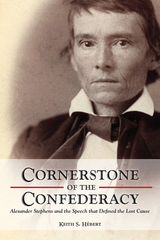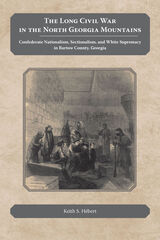
Born in early 1812 in Crawfordville, Georgia, Alexander Stephens grew up in an antebellum South that would one day inform the themes of his famous Cornerstone Speech. While Stephens made many speeches throughout his lifetime, the Cornerstone Speech is the discourse for which he is best remembered. Stephens delivered it on March 21, 1861—one month after his appointment as vice president of the Confederacy—asserting that slavery and white supremacy comprised the cornerstone of the Confederate States of America. Within a few short weeks, more than two hundred newspapers worldwide had reprinted Stephens’s words.
Following the war and the defeat of the Confederacy, Stephens claimed that his assertions in the Cornerstone Speech had been misrepresented, his meaning misunderstood, as he sought to breathe new and different life into an oration that may have otherwise been forgotten. His intentionally ambiguous rhetoric throughout the postwar years obscured his true antebellum position on slavery and its centrality to the Confederate Nation and lent itself to early constructions of Lost Cause mythology.
In Cornerstone of the Confederacy, Keith Hébert examines how Alexander Stephens originally constructed, and then reinterpreted, his well-known Cornerstone Speech. Hébert illustrates the complexity of Stephens’s legacy across eight chronological chapters, meticulously tracing how this speech, still widely cited in the age of Black Lives Matter, reverberated in the nation’s consciousness during Reconstruction, through the early twentieth century, and in debates about commemoration of the Civil War that live on in the headlines today.
Audiences both inside and outside of academia will quickly discover that the book’s implications span far beyond the memorialization of Confederate symbols, grappling with the animating ideas of the past and discovering how these ideas continue to inform the present.

Civil War historians have long noted that support for the Confederacy in the antebellum South tended to align with geography: those who lived in towns, along railroads, and on land suited for large-scale farming tended to side with the Confederacy, while those who lived a more isolated existence and made their livings by subsistence farming and bartering usually remained Unionist. Bartow County in northwest Georgia, with its distinctive terrain of valley, piedmont, and Appalachian hill country, is an ideal microcosm to examine these issues.
Keith S. Hébert examines the rise and precipitous fall of Confederate nationalism in Bartow County, a shared experience among many counties in the upland South. Hébert’s story tells us much about the war’s origins, Confederate defeat, and the enduring legacy of white supremacy in these rural areas. Although no major battles were fought in Bartow County, Sherman’s Atlanta Campaign saw Federal troops occupying the area, testing the loyalties of Bartow County soldiers serving in the Army of Tennessee and elsewhere. As the home front collapsed, they had to decide if they should remain in the army and fight or return home to protect their families and property. Locals hardly knew whom to trust as Unionists and Confederates—from both home and afar—engaged in guerilla warfare, stole resources from citizens, and made the war a confusing trap rather than a struggle for an emergent nation.
Drawing on the primary source record of newspapers, letters, diaries, and official documents from the county, Hébert compellingly works personalized vignettes into a scholarly study of developments from the advent of war through Reconstruction and the decades following. The Long Civil War in the North Georgia Mountains solidifies recent scholarship about the war in southern Appalachia and opens a window into a community deeply divided by civil war.
KEITH S. HÉBERT, assistant professor of history at Auburn University, was formerly state historian at the Georgia Department of Natural Resources, Historic Preservation Division. His writing has appeared in The Georgia Historical Quarterly and Reconstructing Appalachia: The Civil War’s Aftermath.
READERS
Browse our collection.
PUBLISHERS
See BiblioVault's publisher services.
STUDENT SERVICES
Files for college accessibility offices.
UChicago Accessibility Resources
home | accessibility | search | about | contact us
BiblioVault ® 2001 - 2024
The University of Chicago Press









